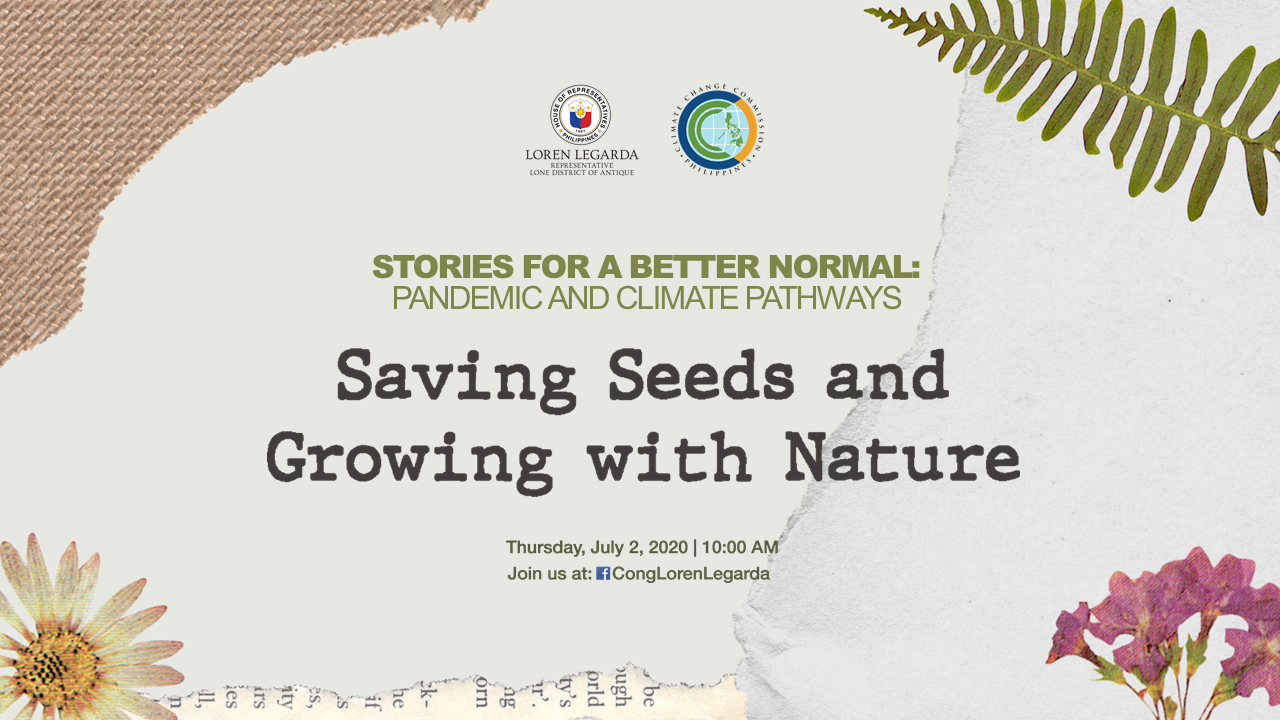
July 01, 2020 Wednesday

MANILA, 2 July 2020 — On the seventh episode of “Stories for a Better Normal: Pandemic and Climate Pathways,” with the topic, “Saving Seeds and Growing with Nature,” House Deputy Speaker and Antique Representative Loren Legarda and experts shared the basics of permaculture and encouraged individuals and households to start saving their own seeds and grow food in a manner that heals nature.
Joining Legarda were permaculture practitioners and seed saving experts and enthusiasts, including Bert Peeters of the Philippine Permaculture Association; Jabez Flores of Permaculture Research PH; Rina Papio of Green Space Pilipinas; Karen Hizola of Global Seed Savers PH, and Dr. Blesilda Calub of the University of the Philippines - Los Baños.
Environmental lawyer Atty. Ipat Luna; Earth Leader and founder of Kai Farms Karla Delgado; and DowntoEarth PH founder Atty. Paula Aberasturi joined as panel reactors.
Mr. Bert Peeters described permaculture as designing with nature through an ecosystems and biodiversity approach. He also explained how permaculture empowers communities.
“Permaculture in action entails working with a lot of local government units (LGUs). It is being able to make products that are locally relevant with the abundant materials that are in the area. It is also teaching people how they can craft and use raw materials into something useful like baskets or bamboo bikes, or wines and juices,” said Peeters.
Mr. Jabez Flores talked about the permaculture and biodiversity mapping of the Philippines, which is an essential tool that allows farmers and researchers to visualize the geographic location of their potential sites, determine the available resources, and identify farm components.
Flores also highlighted that there are species that act as natural pest control, seed dispersers, or pollinators, thereby making the entire ecosystem more functional and resilient.
“Permaculture landscapes are designed for diversity. The aim is not just to promote biotic diversity with crops, wildlife, and trees, but also biophysical and sociocultural biodiversity as well, which are sometimes neglected in the design,” said Flores.
Ms. Rina Papio discussed the importance of soil health and illustrated new ways of turning food waste into healthy soil through Bokashi composting.
“Whenever we send our food waste to the landfill, we are throwing away a valuable resource that can help build soil. It’s time we make a change from being land fillers to land healers,” said Papio.
Ms. Karen Hizola showed the basic steps of seed collection and storage, encouraging more people to adopt seed-saving practices as she highlighted their benefits.
“Why are seeds very important in our lives, especially sa panahon ngayon ng pandemya? When you hold a seed in your hand, it is like holding the past, the present, and the future because mayroon kang record ng kung ano mang tanim ang na-produce ng seeds na 'yun. You are holding the future in your hand because seeds are actually self-replicating and key in making sure that we are able to flourish in the future” said Hizola.
Dr. Calub explained how the UP Los Baños and its surrounding communities have benefited from the school gardens, home gardens, and community gardens through their mentorship and learning resources.
“We made use of the school gardens as an open air classroom for teaching Edukasyong Pantahanan at Pangkabuhayan, Science, Math, and English. We integrate in these subjects the science of food and nutrition, organic agriculture, edible landscaping, climate resilience, and composting from biodegradable wastes,” said Dr. Calub.
Legarda, author of House Bill no. 637 or the Food Gardening Act of 2019 and Republic Act No. 9003 or the Ecological Solid Waste Management Law, reiterated the need for every household to implement segregation of food waste and composting in practicing permaculture.
“There’s so much we could do together to help implement existing environmental laws. When we design small or big farms in rural or urban areas, let’s make sure that every local government, people’s organization, and citizen can understand, implement, operationalize, and benefit from permaculture,” said Legarda.
As an online discussion to promote health, environmental consciousness, and climate-adaptive practices, Stories for a Better Normal aims to change the mindset of individuals, families, and communities to lead sustainable lives towards a healthier, safer, and much better normal than we used to have.
This online discussion is organized in partnership between the Office of Deputy Speaker Legarda and the Climate Change Commission (CCC), with support from the Institute for Climate and Sustainable Cities (ICSC), The Climate Reality Project-Philippines, and Mother Earth Foundation.